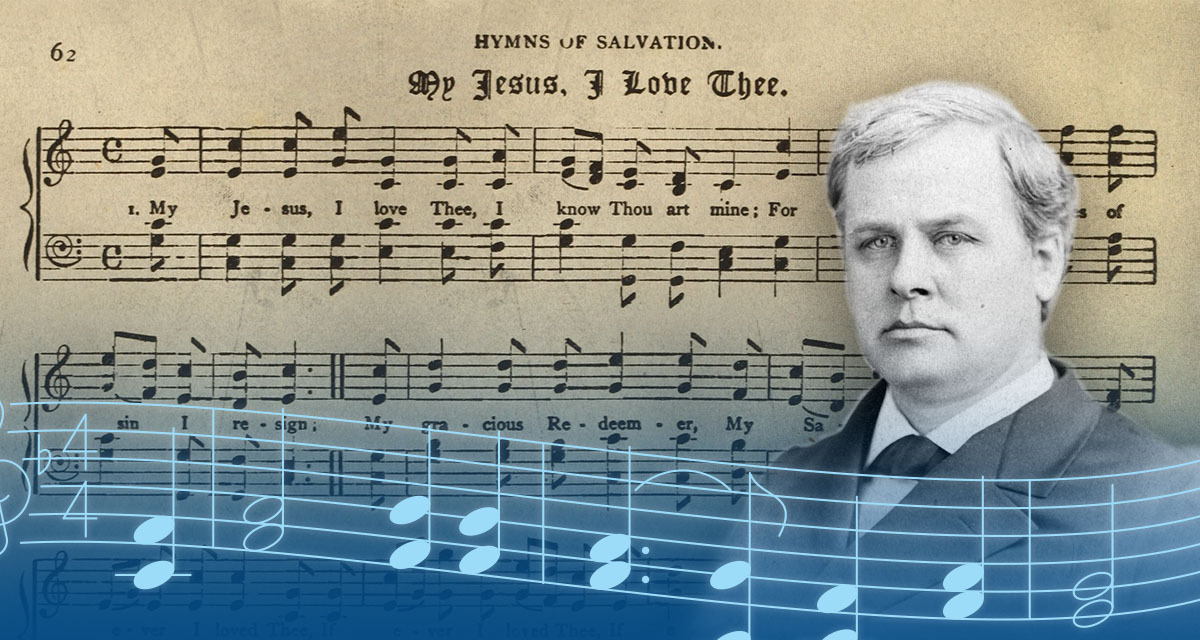If Ever I Loved Thee, My Jesus, ‘Tis Now
By Jessica Vandervort ’20, academic tutor and teaching assistant
As followers of Christ around the world sing hymns to honor his death and resurrection this Holy Week, Gordon alumna and staff member Jessica Vandervort ’20 offers a personal reflection on one particular hymn that is near and dear to many in the Gordon community.
If you are like me, when you hear those beloved words, “If ever I loved thee, my Jesus, ‘tis now,” you cannot help but envision the sparkling waters of Coy Pond, days researching in the Jenks stacks or dinners in the “Darkside” (now Tupper Hall) of Lane Student Center. For many of us, “My Jesus, I Love Thee” will forever be an integral reminder of our time at Gordon. Yet, like me, you also probably have not known much of the story behind the words we often affectionately dub the “Gordon hymn.”
Earlier this year, my church sang “My Jesus, I Love Thee” in our Sunday morning worship service. Several of us—Gordon alumni from across the years—were excited to sing our Gordon anthem as a congregation. Back home later that day, I noticed in an old hymnal that Gordon’s name is listed under the tune, but no name is listed under the lyrics. Thus began an investigation that led me to learn that contrary to popular Gordon “legend,” Adoniram Judson (A. J.) Gordon was not actually the writer of those cherished words we know so well.
No, not A. J. Gordon, but rather a William Ralph Featherstone was the author of then-poem “My Jesus, I Love Thee.” Though not much is known of the young man’s life, and even his date of birth and death are contested, we do know that William Featherstone grew up in Canada, attending a Wesleyan Methodist church. We also know that he was at most 16 years of age when he experienced a conversion to the faith and responded by penning the beloved lyrics we sing today.
Let me repeat that in case you missed it: William Ralph Featherstone wrote the lyrics of “My Jesus, I Love Thee” when he was but 16 years old.
The young man sent his poem to a relative in California, who eventually published the poem in the 1864 edition of the London Hymnal. Still many years later, A. J. Gordon would find the hymnal and be inspired to set the beautiful words to the cherished tune we still use today, allowing William’s words to reach generations. William, though, would never see that day, as he passed away sometime in his 20s.
I sit here and cannot help but consider how poignant and inspiring the story is behind those precious words we may sometimes take for granted. The author was not even old enough to be a first-year college student when he penned words we still sing today, and his own earthly life must have seemed so very short to those who knew him. Yet, what wonders God can do, both in and through, a life that is devoted to him! William’s strong faith is evidenced in the words he penned, and his love for Christ is an encouragement we can still be inspired by today.
I am so very thankful for a young boy’s words, and our A. J. Gordon’s faithful wisdom in setting those words to music. We may never know, this side of heaven, the true impact of living lives in faithfulness, nor how our small acts of faith may be used by generations in the future. But dear friends, let us stay faithful! May we love the one we have not yet seen and serve wholeheartedly, no matter how young or old, equipped or unready, weak or tired, you may feel. For if God can use a 16-year-old boy’s words to inspire a well-loved hymn-writer, and in turn bless generations for his glory, he can surely use you, too!
My Jesus, I love thee, I know thou art mine;
for thee all the follies of sin I resign;
my gracious Redeemer, my Savior art thou;
if ever I loved thee, my Jesus, ’tis now.
I love thee because thou hast first loved me
and purchased my pardon on Calvary’s tree;
I love thee for wearing the thorns on thy brow;
if ever I loved thee, my Jesus, ’tis now.
I’ll love thee in life, I will love thee in death,
and praise thee as long as thou lendest me breath,
and say when the deathdew lies cold on my brow:
If ever I loved thee, my Jesus, ’tis now.
In mansions of glory and endless delight,
I’ll ever adore thee in heaven so bright;
I’ll sing with the glittering crown on my brow:
If ever I loved thee, my Jesus, ’tis now.
 The Bell
The Bell